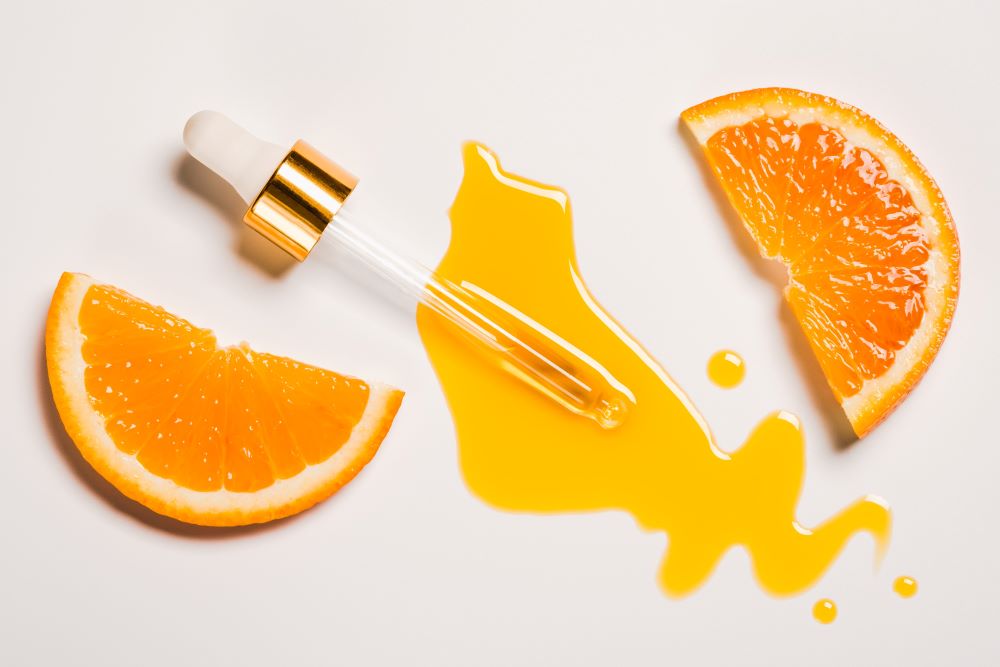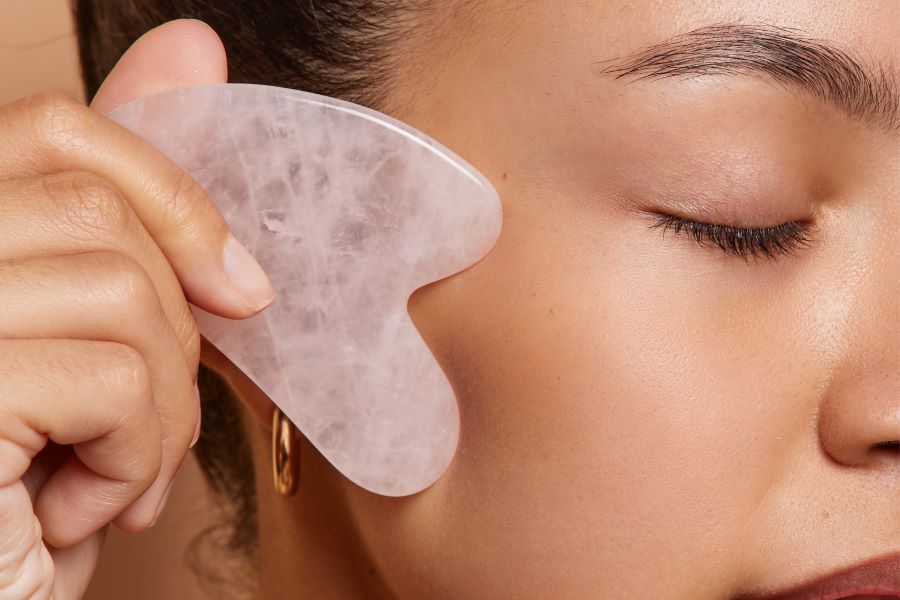The Best Age To Start Using Different Skincare Ingredients

Link to share article here:
Ingredient Deep Dive: Vitamin C
Whether you’re a skincare expert or a relative newbie, you’ll be well aware of vitamin C. It might be more familiar to you in a glass of orange juice than in a skin serum, but a healthy dose of vitamin C is a great way to start your day for several reasons.
To celebrate the launch of our two new Brighten + Boost Vitamin C Serums, we sat down with our expert Head of Medical, Dr Jason Thomson, for the full lowdown on all things vitamin C, including how to use it, why to use it, and the other ingredients that make the perfect partners for this multitasking hero.
What is vitamin C?
Vitamin C, also known as ascorbic acid, is a nutrient found in plenty of fruits and vegetables – as you probably know, it’s pretty essential for your overall health. However, over the last few years it’s been growing in popularity as a topical skincare product too, due to a whole host of benefits.
Vitamin C is also an antioxidant, meaning that it provides protection against free radicals and pollutants – think of it like a shield when applied directly to the skin.
What are the benefits of vitamin C?
“Vitamin C is one of the most studied and evidence-based cosmetic skincare ingredients and is a true multi-tasker, offering protective and regenerative skin benefits,” explains Dr Jason Thomson,
As we mentioned, vitamin C works hard to guard the outer surface of the skin, known as the epidermis. “It’s an essential antioxidant that aids in the skin’s natural regeneration process and helps to neutralise free radicals, protecting the skin from damage caused by UV rays (when used alongside sunscreen) and environmental pollutants,” says Dr Jason.
Vitamin C can also help boost collagen production. Collagen is found in the deeper layer of skin, known as the dermis, and acts as the scaffolding of the skin, keeping it strong and supple. We know that collagen starts to degrade with age, so vitamin C can play an important role in keeping the skin looking and feeling youthful for longer. If this is your goal, we’d recommend using Brighten + Boost Firming Vitamin C Serum.
Got dark spots? Vitamin C can also offer a line of attack against unwanted pigmentation and regulate your skin tone. By blocking and slowing down the production of melanin in the skin, vitamin C can help fade dark spots, reducing acne-induced pigmentation or sun damage and leaving your skin looking even and healthy. If this is your goal, we’d recommend using Brighten + Boost Regulating Vitamin C Serum. Finally, vitamin C is also renowned for its brightening abilities.” It’s an excellent ingredient to enhance the skin’s natural glow and radiance,” notes Dr Jason.
Are there any side effects to using vitamin C?
Vitamin C is usually well-tolerated by most skin types, regardless of your skin goal. However, if you’re using it with other active ingredients, you might experience a level of irritation, especially if you have really sensitive skin. If you have oily skin, you might find some vitamin C products too oily or too hydrating for you.
Vitamin C is also infamous for being unstable. “Pure Vitamin C (known as L-ascorbic acid) is a notoriously difficult ingredient to formulate as it is highly reactive and breaks down when exposed to oxygen and sunlight,” explains Dr Jason.
“We’ve worked hard to develop two stable highly efficacious Vitamin C products that incorporate a complex of encapsulated ascorbic acid and a highly stable Vitamin C derivative called ethyl ascorbic acid which are effectively absorbed into the skin for maximum efficacy.”
That’s also why we’ve packed the Brighten + Boost Vitamin C Serums in dark-coloured bottles, and ship out a new bottle every two months to subscribers, which ensures it’s both fresh and effective.
How should I use vitamin C in my skincare routine?
Vitamin C is most commonly found in serums, but it’s also used in moisturisers and cleansers. We’d recommend using a serum if you want to get the full benefits of vitamin C, as it will allow your skin to fully absorb the goodness.
As long as you’re consistent with applying vitamin C serum, the time of day you apply it doesn’t matter. However, if you’re using other active ingredients such as retinoids or exfoliating acids, you’ll want to save those for your evening routine, and stick with vitamin C in the morning as the ‘treat’ step after cleansing, before moisturising. Apply three to four drops of your vitamin C serum to your skin after cleansing but before you apply your moisturiser. As always, make sure you’re wearing a broad-spectrum sunscreen, with SPF 30 or higher, as the last step in your skincare routine before you head out the door or apply makeup.
What does vitamin C work best with?
VITAMIN E
A superb pair of antioxidants, vitamins C and E work really well together. They can tackle damage from the sun and are a powerhouse combination in the face of pollutants and free radicals. Vitamin E protects and nourishes your skin barrier, while vitamin C leads the charge.
PEPTIDES
Peptides are generating a bit of a buzz at the moment, and for good reason. “Peptides are short chains of amino acids that act as building blocks of proteins, such as collagen, elastin, and keratin, which are essential for maintaining the skin’s structure, elasticity, and firmness,” says Dr Jason. They’re an excellent way to boost your skin barrier and offer anti-inflammatory benefits, making them the perfect partner for vitamin C treatments.
Peptides can also target specific skin concerns, which is why they were must-haves in our Brighten + Boost Serums. In the Firming Vitamin C Serum, you’ll find peptides that have been specifically chosen for their tightening properties. Palmitoyl Tetrapeptide-7, Palmitoyl Tripeptide-1 and Acetyl Hexapeptide-8, to give them their proper names, boost collagen and improve skin elasticity, helping to tackle the early signs of ageing.
In the Regulating Vitamin C Serum, we’ve included Acetyl Hexapeptide-1, a peptide designed to fade areas of unwanted pigmentation by regulating melanin pathways. It also has a brightening effect, which clarifies and evens out your skin tone.
If your goal is luminous, even skin, then vitamin C and peptides are a match made in skincare heaven – and if you’re a Skin + Me member, we’ll even recommend the best Brighten + Boost serum for you and your skin goals when you add a bottle to your next box.
FERULIC ACID
This antioxidant boosts the effectiveness of others, so you’ll often find it in formulations with vitamin C to maximise its power against pollutants. Along with vitamin E, ferulic acid helps to keep vitamin C stable, stopping it from breaking down as quickly.
HUMECTANTS
Humectants are substances that retain or preserve moisture, so if dewy, healthy skin is your goal then they’re a must-have. Look out for bisabolol, panthenol and allantoin – these heroic hydrators are a great partner to vitamin C, keeping the skin fresh and dewy, while vitamin C safeguards against free radical damage.
NIACINAMIDE
We love niacinamide, but when paired with fellow antioxidant vitamin C? Stunning! These two actives work in tandem to safeguard the skin from pollutants and fade dark spots and pigmentation from melasma, sun damage or acne. Both are great for tackling the early signs of skin-ageing too. While vitamin C helps replenish the skin’s collagen, niacinamide helps prevent water-loss and keep pore visibility to a minimum.
RETINOIDS
Dr Jason tells us, “If you want to treat fine lines and prevent photo-ageing, in addition to the essential sunscreen, you’ll want a retinoid in the evening and vitamin C in the morning.”As above, using vitamin C in the morning and retinoids in the evening is a good way of ensuring the two don’t mix and irritate your skin, while also getting the benefits of both. Retinoids can also oxidise vitamin C, making it ineffective, so it’s definitely wise to keep them separate if you intend on using both in your routine.
What doesn’t work well with vitamin C?
EXFOLIATING ACIDS
In a nutshell, using exfoliating acids like AHAs or BHAs alongside vitamin C could overwhelm your skin barrier and do more harm than good, causing side effects like inflammation or dry, sensitive and painful skin.
BENZOYL PEROXIDE
This one comes down to plain old chemistry. Without getting too technical, benzoyl peroxide oxidises vitamin C, rendering it useless. If you’re keen to use a spot-treatment and a vitamin C, try a pimple patch or stick with a trusty retinoid in your evening routine.
Final thoughts
Understanding the active ingredients in your routine, and what they do for your skin, makes you a smarter skincare fan – the more you know, the sooner you’ll be on your way to reaping the benefits.
And, if you’re intrigued by vitamin C, why not head to our Skincare Shop? It’s the perfect way to brighten both your skin and your morning.
New to Skin + Me? Get your first month of personalised skincare for £4.99 with promo code DOSE – complete our quick consultation here.
Looking for a routine refresh? Add the Dream Routine to your Skin + Me subscription.
In need of a restock? Head to The Skincare Shop for one-off purchases of your Routine Essentials.



